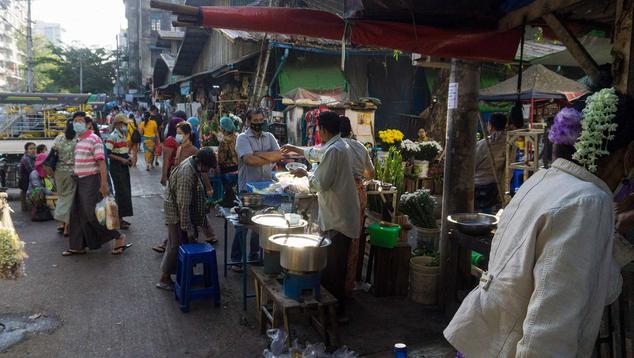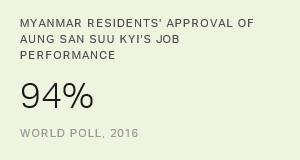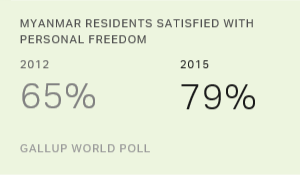Story Highlights
- 89% in Myanmar were satisfied with their personal freedom in 2019
- 67% said the country's media had a lot of freedom
- 51% reported they had internet access
This analysis features results from Gallup's surveys in Myanmar between 2012 and 2019. Gallup will release the results from its 2020 surveys in Myanmar within the next several days.
WASHINGTON, D.C. -- The military coup in Myanmar this week likely means the end of the country's transition to democracy. It also threatens to curtail the personal freedoms that many in Myanmar have come to embrace since they last emerged from military rule: In 2019, nearly nine in 10 (89%) adults in Myanmar reported feeling satisfied with the freedom they have to choose what they do with their lives.
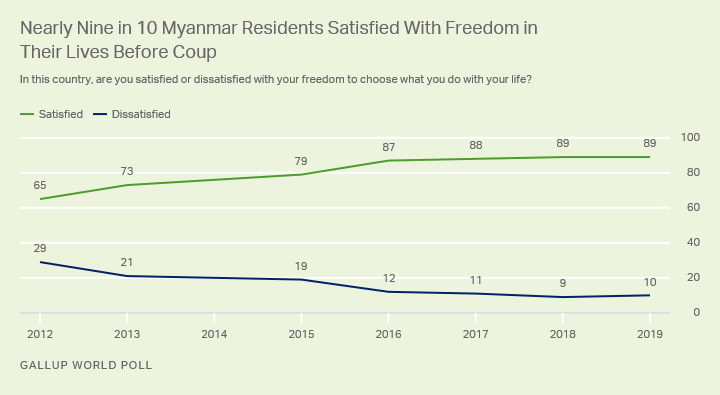
Line graph. In 2019, 89% of Myanmar's residents said they were satisfied with the freedom in their lives, while 10% said they were dissatisfied.
People's sense of freedom evolved in Myanmar as the country slowly started to transform from decades of military dictatorship to democracy. In 2011, the military government opened the long-isolated country up to the wider world, allowing internet access, freeing political prisoners, permitting peaceful demonstrations and allowing opposition parties to take part in the 2012 parliamentary election. In the wake of these reforms, 65% of Myanmar residents said they were satisfied with the freedom they have to choose to do what they want with their lives.
Satisfaction only continued to rise after that. In Gallup's 2016 survey, conducted after the now-detained Aung San Suu Kyi led her National League for Democracy (NLD) political party to victory in the country's first free elections in 2015, 87% were satisfied with their personal freedom. Satisfaction remained at or slightly above that level through 2019.
Most Myanmar Residents Saw Country's Media as Free
At the time of the coup, the army took international and domestic television and radio stations, as well as the state broadcasters, off the air -- leaving many in the country deliberately in the dark. Prior to the coup, 67% in Myanmar said the country's media had a lot of freedom. This is substantially higher than the 53% who said the same in 2012 -- after the government ended its practice of censorship. However, it is down modestly from the trend-high 74% registered in 2016, coinciding with the reported erosion of press freedom in the country.
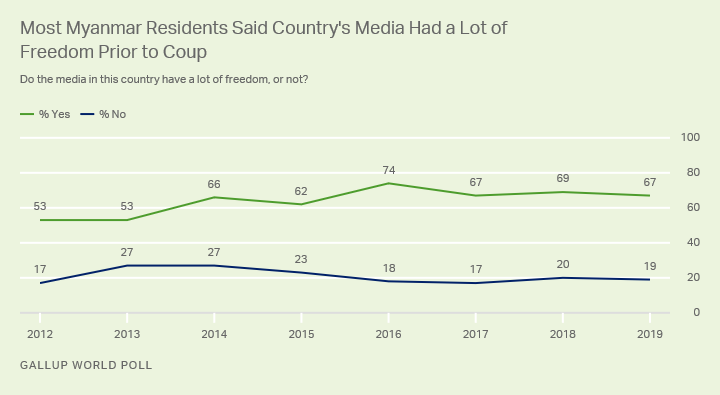
Line graph. Before the military coup in early February, 67% of Myanmar's residents in 2019 said their country's media had a lot of freedom, and 19% said they did not.
Internet Access in Myanmar Had Been Increasing Prior to Coup Cut
One of the first moves by coup leaders in Myanmar has been to curb the ability of the country's residents to communicate with each other and the wider world by cutting off media in the country, as well as access to the internet. Before the coup, internet access in Myanmar had been expanding, with 51% saying they had access in 2019.
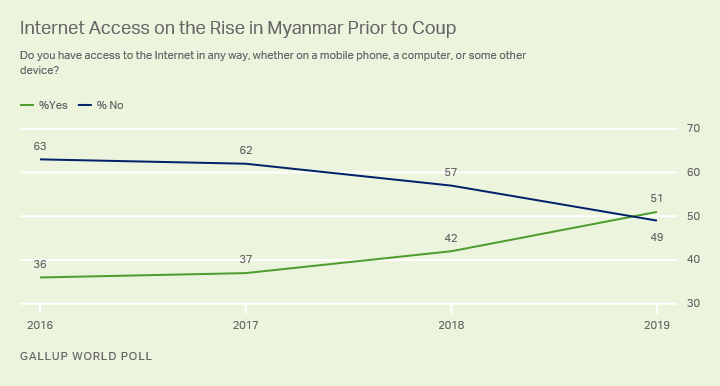
Line graph. Before the recent military coup, 51% of Myanmar's residents had access to the internet, up from 36% in 2016.
Under military rule, residents of Myanmar had long been denied access to the internet, only gaining this freedom in 2012. In Gallup's first survey on the issue, 2016, roughly a third of the country's residents had internet access. However, over the last few years, access grew steadily.
Bottom Line
Since absolute military control of Myanmar ended in 2012, freedom for residents of the country had gradually expanded but remained fragile. People in Myanmar were increasingly satisfied with their freedoms, and likely, their growing access to the wider world, through increased internet access. The country appeared on a rocky road to becoming more democratic, but the Feb. 1 military takeover throws that future into question.
Nobel Prize winner Suu Kyi, who has been the international face of democracy in the country, has been detained by the military, who have declared a state of emergency that will last at least one year. The actions of the military plotters have already rolled back many of the perceived freedoms that had been instituted over the past decade.
Watch news.gallup.com for new analysis of Gallup's data collected in Myanmar in 2020.
For complete methodology and specific survey dates, please review Gallup's Country Data Set details.
Learn more about how the Gallup World Poll works.
